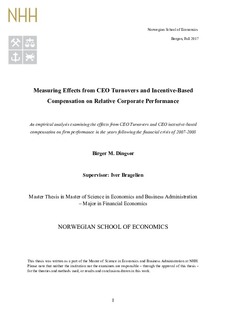| dc.description.abstract | This thesis seeks to increase our understanding of performance-enhancing decisions of
company boards, with a specific focus on CEO turnovers and compensation policies
following financial shocks. Using a self-made set of data including 830 CEO turnovers from
726 companies from the S&P1500, the thesis includes complete analyses of effects both
related to CEO turnovers, and the effects of providing incoming CEOs with incentive-based
compensation early after employment. The effects from the compensation factors are firstly
measured on the full sample using different regression techniques and time aspects. The
effects are thereafter analyzed on two different samples. Low ownership CEOs and high
ownership CEOs respectively. This in turn to see if the two samples are motivated differently
to affect firm performance, and also if the low ownership CEOs are more motivated by
receiving new equity grants than receiving other incentive-based compensation components.
The performance of the relevant companies is measured using both accounting- and marketbased
measures, in order to best explain the effects of the boards initiatives.
Based on turnovers in 2010, I find that the EBITDA margin provides inverse relationships
comparing pre-turnover to post-turnover performance, improving after the employment of the
new CEO. The same relationship is found looking at the EBITDA margin for turnovers in
2012. ROE creates sustainable growth in the years post-turnover for turnovers in 2011, while
ROA provides general improvement for turnovers in 2009 and 2012. I find that the fraction
of option grants in incoming CEO compensation packages provides significant positive
relationships to industry-adjusted ROA the following year in the sample. In other words,
providing incoming CEOs with relatively more option grants, early after employment, seems
to increase the return on assets for the sample companies included. I also find positive
significant relationships between new stock grants for the CEOs and industry-adjusted priceto-book.
Focusing on the low ownership CEOs, it seems that their already existing ownership
in the firm has a negative effect on ROA. New stock grants for the low ownership CEOs are
however associated with positive effects on the EBITDA margin. The high ownership sample
is recognized by having positive effects from bonus, option awards and existing ownership. | nb_NO |
